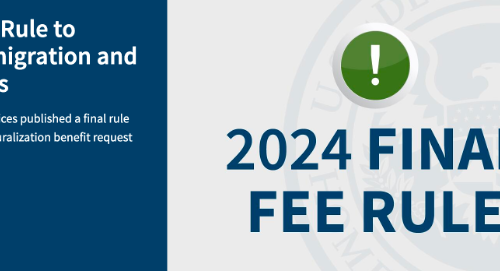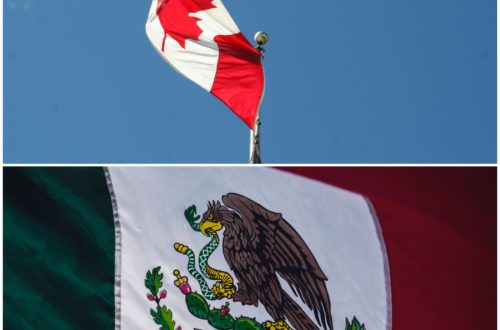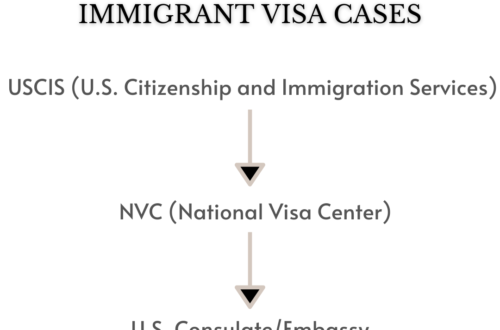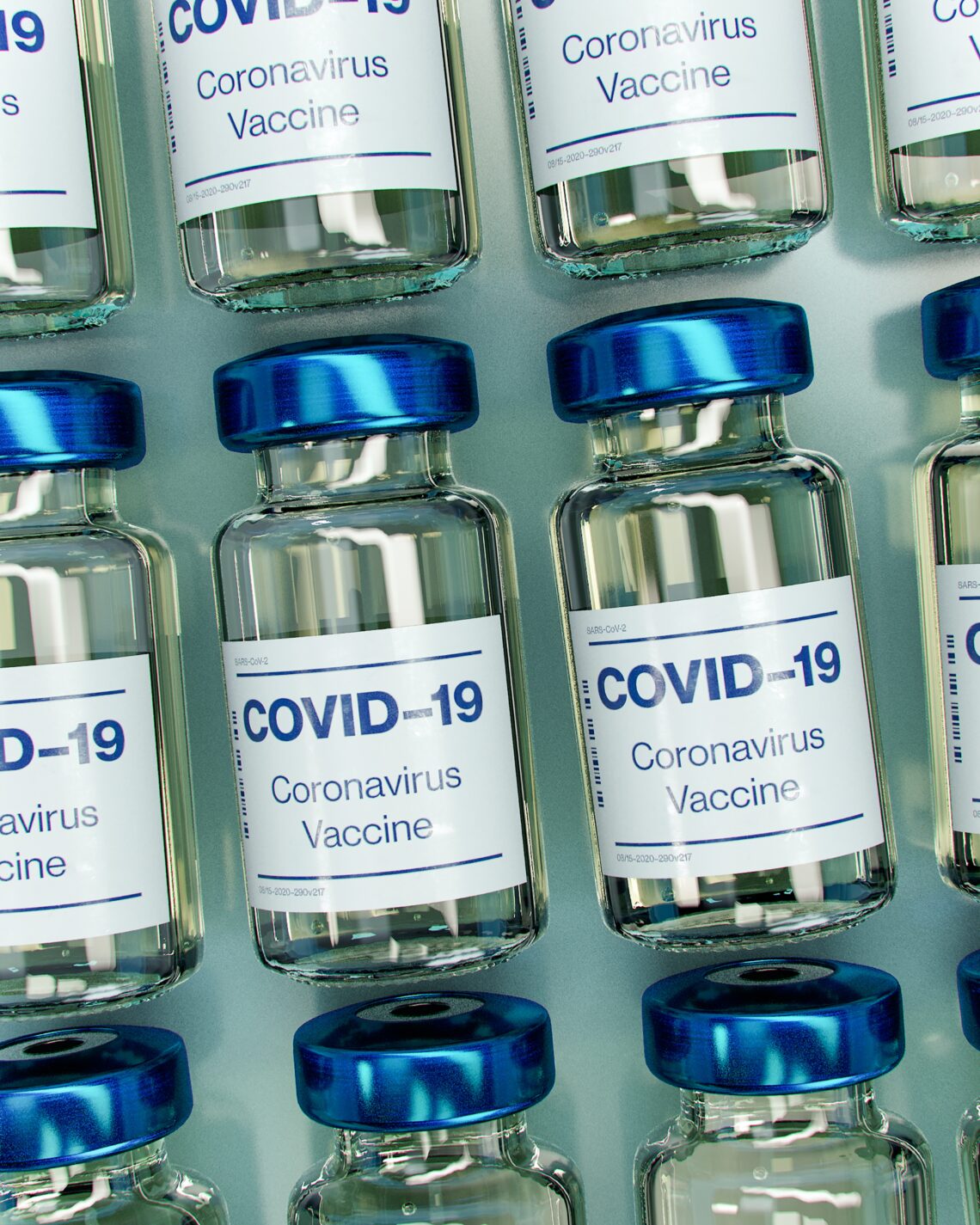-
The Department of Homeland Security Announces Parole-in-Place Process That Will Offer A Pathway to A Green Card for Undocumented Spouses of U.S. Citizens
On June 18, 2024, the Department of Homeland Security (DHS) made a big announcement and introduced a new parole-in-place process for certain noncitizen spouses of U.S. citizens who meet specific criteria. *IMPORTANT NOTE* – As of the date of this blog post, this process is NOT in effect, and there is NO application process for it yet. Do not apply for it, and if someone is telling you they can help you apply for it right now and submit an application, it is not true. Here is a summary of who would qualify for this process and what immigration benefits it will offer: If an individual qualifies for this process,…
-
USCIS Filing Fees Changing on April 1, 2024
On January 30, 2024, USCIS made this official by releasing a final rule that will result in a change of certain filing fees. Although some fees are going down, many are going up. A change in fees hasn’t occurred since 2016. USCIS says that this change will help improve efficiency, reduce backlogs), and ensure that applications are timely processed. You can read the full USCIS announcement here. Currently, the filing fee for filing a marriage-based adjustment of status green card application is $1760 for everything (petition, green card application, work permit application, and travel document). Starting April 1, 2024, the filing fees will be as follows depending on if you…
-
The Dignity Act of 2023: A New Immigration Bill Explained
Representative Maria Elvira Salazar (R-Florida) introduced this immigration bill in the House of Representatives on May 23, 2023. This bill was created by both Democrats and Republicans to address various aspects of immigration law in the United States. It addresses border security, border infrastructure, grants legal status to undocumented immigrants already living in the United States with the possibility of getting citizenship, establishes new pathways for asylum seekers, and creates new legal pathways for economic migrants and unaccompanied minors. Below is a summary of the bill. Border Security: The bill would provide funds for upgrading technology and equipment used by the US Customs and Border Patrol (CBP). This includes things like…
-
K-1 Fiancé(e) Visa and Protection Under the Violence Against Women Act (VAWA)
In this post, we will explore two special cases in family-based immigration: fiancé(e) visas and protection under the Violence Against Women Act (VAWA). If you are a U.S. citizen and engaged to a foreign national, you can file a fiancé(e) petition, so your fiancé(e) can get a visa to come to the U.S., also known as the K-1 visa. This visa allows your fiancé(e) to enter the U.S., and you would have to get married within 90 days of your fiance(e) arriving in the U.S. To apply for a K-1 visa, the U.S. citizen petitioner must first file a Form I-129F, Petition for Alien Fiancé(e), with the USCIS. Once the…
-
What Your Obligations Are As An I-864 Financial Sponsor of An Immigrant
As an I-864 sponsor, you are financially responsible for the immigrant you are sponsoring. This means that if the immigrant receives certain means-tested public benefits or becomes dependent on the government for support, you may be required to reimburse the government for the cost of those benefits. A means-tested public benefit is a type of government assistance program that is based on a person’s income or financial resources. Examples of means-tested public benefits include Medicaid, Supplemental Nutrition Assistance Program (SNAP), Temporary Assistance for Needy Families (TANF), and Supplemental Security Income (SSI). When an immigrant receives means-tested public benefits, it can affect the financial responsibility of the I-864 sponsor. If the…
-
Can Working Without Authorization In the U.S. Prevent You From Getting A Green Card?
Working without authorization in the United States is a serious violation of U.S. immigration law, and can lead to you not being able to get a green card in the future. However, if you are married to a U.S. citizen and you’re getting your green card through your marriage, or you’re an “immediate relative” of a U.S. citizen, you can be forgiven for working without authorization assuming you did not claim to be a U.S. citizen when you applied for the job. This scenario comes up all the time with my clients, and it’s always something they worry and ask about, but the immigration laws actually automatically forgive this if…
-
Which One Processes Faster? A Fiance(e) Visa or Spouse Visa?
I meet with many people who ask me if they should do a fiance visa or spouse visa if their significant other is not in the U.S. and will process at a U.S. consulate. Generally speaking, the fiance visa will be faster if the goal is to be together in the U.S. as soon as possible. Remember that once your fiance comes to the U.S. with the fiance visa (K1 visa), you must get married within 90 days of your fiance entering. Once you are married, the green card application can be filed, and your fiance would remain in the U.S. while that is processed. Eventually, an interview will be…
-
Employment-Based Immigration, Family-Based Immigration, Green Card, Lawful Permanent Residency, Policy Change, U.S. Citizenship
Why Could Your Case Be Taking So Long? USCIS Processing Delays Remain at Crisis Level
Nationwide, you and millions of families, businesses, and individuals applying for immigration benefits are waiting longer for U.S. Citizenship and Immigration Services (USCIS) to process and approve applications and petitions. Based on previously available USCIS data, in Fiscal Year (FY) 2014, an average case took about five months to process. In FY2020, an average case took more than nine months. Anyone who files applications or petitions with USCIS is affected. You and other people applying for family-based benefits, employment-based benefits, naturalization, travel documents, and employment authorization are all experiencing delays. Between FY2017 and FY2019, USCIS’s processing times for all petitions and application form types rose more than 37%. The dramatic…
-
The 3 Agencies Involved in Immigrant Visa Cases: USCIS, NVC, and the U.S. Consulate/Embassy
I want to preface this post by saying that all three of these agencies are involved when a family member or employee is being petitioned for, and that person is not currently in the U.S. and will be processing at a U.S. consulate/embassy abroad. However, there are instances when a person is going through the immigration process that involves the I-601A stateside waiver process (you can read more about that process on this blog post), and dealing with these three agencies would also apply in those cases. For anyone who wants to be petitioned for, or if the person is self-petitioning, to become a green card holder in the U.S.,…
-
Employment-Based Immigration, Family-Based Immigration, Green Card, Lawful Permanent Residency, Policy Change
COVID-19 Vaccines Will Be Required for Green Card Applicants Starting October 1, 2021
Starting October 1, 2021, U.S. Citizenship and Immigration Services (USCIS) and the U.S. Department of State will require COVID-19 vaccinations for all applicants applying for refugee or lawful permanent residence, with some exceptions. All applicants who receive their medical examination ON OR AFTER October 1, 2021, must complete the COVID-19 vaccine series and provide documentation of vaccination. This change will impact anyone who completes the medical exam ON OR AFTER October 1, 2021. If the exam is completed BEFORE October 1, 2021, and it remains valid, the COVID-19 vaccine will not be required. Waivers for the vaccine may be available in these scenarios: -Not age-appropriate -Contraindiction – a reason for…























